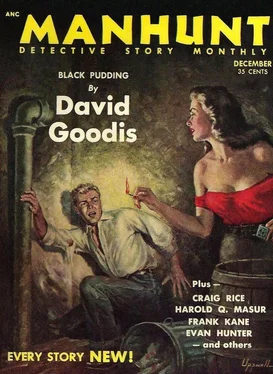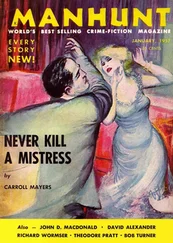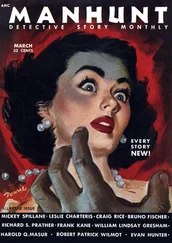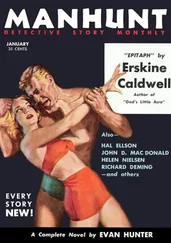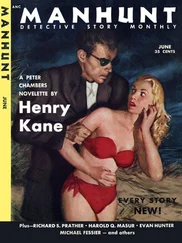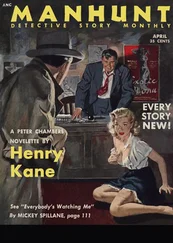Джонатан Крейг - Manhunt. Volume 1, Number 12, December, 1953
Здесь есть возможность читать онлайн «Джонатан Крейг - Manhunt. Volume 1, Number 12, December, 1953» весь текст электронной книги совершенно бесплатно (целиком полную версию без сокращений). В некоторых случаях можно слушать аудио, скачать через торрент в формате fb2 и присутствует краткое содержание. Город: New York, Год выпуска: 1953, Издательство: Flying Eagle Publications, Жанр: Детектив, на английском языке. Описание произведения, (предисловие) а так же отзывы посетителей доступны на портале библиотеки ЛибКат.
- Название:Manhunt. Volume 1, Number 12, December, 1953
- Автор:
- Издательство:Flying Eagle Publications
- Жанр:
- Год:1953
- Город:New York
- ISBN:нет данных
- Рейтинг книги:4 / 5. Голосов: 1
-
Избранное:Добавить в избранное
- Отзывы:
-
Ваша оценка:
- 80
- 1
- 2
- 3
- 4
- 5
Manhunt. Volume 1, Number 12, December, 1953: краткое содержание, описание и аннотация
Предлагаем к чтению аннотацию, описание, краткое содержание или предисловие (зависит от того, что написал сам автор книги «Manhunt. Volume 1, Number 12, December, 1953»). Если вы не нашли необходимую информацию о книге — напишите в комментариях, мы постараемся отыскать её.
Manhunt. Volume 1, Number 12, December, 1953 — читать онлайн бесплатно полную книгу (весь текст) целиком
Ниже представлен текст книги, разбитый по страницам. Система сохранения места последней прочитанной страницы, позволяет с удобством читать онлайн бесплатно книгу «Manhunt. Volume 1, Number 12, December, 1953», без необходимости каждый раз заново искать на чём Вы остановились. Поставьте закладку, и сможете в любой момент перейти на страницу, на которой закончили чтение.
Интервал:
Закладка:
Manhunt. Volume 1, Number 12, December, 1953

Black Pudding
by David Goodis
Riker had taken Ken’s wife, and put Ken in jail. Now Riker decided that Ken had to die...

They spotted him on Race Street between Ninth and Tenth. It was Chinatown in the tenderloin of Philadelphia and he stood gazing into the window of the Wong Ho restaurant and wishing he had the cash to buy himself some egg-fooyung. The menu in the window priced egg-fooyung at eighty cents an order and he had exactly thirty-one cents in his pocket. He shrugged and started to turn away from the window and just then he heard them coming.
It was their footsteps that told him who they were. There was the squeaky sound of Oscar’s brand-new shoes. And the clumping noise of Coley’s heavy feet. It was nine years since he’d heard their footsteps but he remembered that Oscar had a weakness for new shoes and Coley always walked heavily.
He faced them. They were smiling at him, their features somewhat greenish under the green neon glow that drifted through after-midnight blackness. He saw the weasel eyes and buzzard nose of little Oscar. He transferred his gaze to the thick lips and puffed-out cheeks of tall, obese Coley.
“Hello, Ken.” It was Oscar’s purring voice, Oscar’s lips scarcely moving.
“Hello,” he said to both of them. He blinked a few times. Now the shock was coming. He could feel the waves of shock surging toward him.
“We been looking for you,” Coley said. He flipped his thick thumb over his shoulder to indicate the black Olds 88 parked across the street. “We’ve driven that car clear across the country.”
Ken blinked again. The shock had hit him and now it was past and he was blinking from worry. He knew why they’d been looking for him and he was very worried.
He said quietly, “How’d you know I was in Philly?”
“Grapevine,” Oscar said. “It’s strictly coast-to-coast. It starts from San Quentin and we get tipped-off in Los Angeles. It’s a letter telling the Boss you been paroled. That’s three weeks ago. Then we get letters from Denver and Omaha and a wire from Chicago. And then a phone call from Detroit. We wait to see how far east you’ll travel. Finally we get the call from Philly, and the man tells us you’re on the bum around Skid Row.”
Ken shrugged. He tried to sound casual as he said, “Three thousand miles is a long trip. You must have been anxious to see me.”
Oscar nodded. “Very anxious.” He sort of floated closer to Ken. And Coley also moved in. It was slow and quiet and it didn’t seem like menace but they were crowding him and finally they had him backed up against the restaurant window.
He said to himself, They’ve got you, they’ve found you and they’ve got you and you’re finished.
He shrugged again. “You can’t do it here.”
“Can’t we?” Oscar purred.
“It’s a crowded street,” Ken said. He turned his head to look at the lazy parade of tenderloin citizens on both sides of the street. He saw the bums and the beggars, the winos and the ginheads, the yellow faces of middle-aged opium smokers and the grey faces of two-bit scufflers and hustlers.
“Don’t look at them,” Oscar said. “They can’t help you. Even if they could, they wouldn’t.”
Ken’s smile was sad and resigned. “You’re so right,” he said. His shoulders drooped and his head went down and he saw Oscar reaching into a jacket pocket and taking out the silver-handled tool that had a button on it to release a five-inch blade. He knew there would be no further talk, only action, and it would happen within the next split-second.
In that tiny fraction of time, some gears clanged to shift from low to high in Ken’s brain. His senses and reflexes, dulled from nine years in prison, were suddenly keen and acutely technical and there was no emotion on his face as he moved. He moved very fast, his arms crossing to shape an X, the left hand flat and rigid and banging against Oscar’s wrist, the right hand a fist that caught Coley in the mouth. It sent the two of them staggering backward and gave him the space he wanted and he darted through the gap, sprinting east on Race Street toward Ninth.
As he turned the corner to head north on Ninth, he glanced backward and saw them getting into the Olds. He took a deep breath and continued running up Ninth. He ran straight ahead for approximately fifteen yards and then turned again to make a dash down a narrow alley. In the middle of the alley he hopped a fence, ran across a backyard, hopped another fence, then a few more backyards with more fence-hopping, and then the opened window of a tenement cellar. He lunged at the window, went in head-first, groped for a handhold, couldn’t find any, and plunged through eight feet of blackness onto a pile of empty boxes and tin cans. He landed on his side, his thigh taking most of the impact, so that it didn’t hurt too much. He rolled over and hit the floor and lay there flat on his belly. From a few feet away a pair of green eyes stared at him and he stared back, and then he grinned as though to say, Don’t be afraid, pussy, stay here and keep me company, it’s a tough life and an evil world and us alleycats got to stick together.
But the cat wasn’t trusting any living soul. It let out a soft meow and scampered away. Ken sighed and his grin faded and he felt the pressure of the blackness and the quiet and the loneliness. His mind reached slowly for the road going backward nine years...
It was Los Angeles, and they were a small outfit operating from a first-floor apartment near Figueroa and Jefferson. Their business was armed robbery and their work-area included Beverly Hills and Bel-Air and the wealthy residential districts of Pasadena. They concentrated on expensive jewelry and wouldn’t touch any job that offered less than a ten-grand haul.
There were five of them, Ken and Oscar and Coley and Ken’s wife and the Boss. The name of the Boss was Riker and he was very kind to Ken until the face and body of Ken’s wife became a need and then a craving and finally an obsession. It showed in Riker’s eyes whenever he looked at her. She was a platinum blonde dazzler, a former burlesque dancer named Hilda. She’d been married to Ken for seven months when Riker reached the point where he couldn’t stand it any longer and during a job in Bel-air he banged Ken’s skull with the butt end of a revolver. When the police arrived, Ken was unconscious on the floor and later in the hospital they asked him questions but he wouldn’t answer. In the courtroom he sat with his head bandaged and they asked him more questions and he wouldn’t answer. They gave him five-to-twenty and during his first month in San Quentin he learned from his lawyer that Hilda had obtained a Reno divorce and was married to Riker. He went more or less insane and couldn’t be handled and they put him in solitary.
Later they had him in the infirmary, chained to the bed, and they tried some psychology. They told him he’d regain his emotional health if he’d talk and name some names. He laughed at them. Whenever they coaxed him to talk, he laughed in their faces and presently they’d shrug and walk away.
His first few years in Quentin were spent either in solitary or the infirmary, or under special guard. Then, gradually, he quieted down. He became very quiet and in the laundry-room he worked very hard and was extremely cooperative. During the fifth year he was up for parole and they asked him about the Bel-Air job and he replied quite reasonably that he couldn’t remember, he was afraid to remember, he wanted to forget all about it and arrange a new life for himself. They told him he’d talk or he’d do the limit. He said he was sorry but he couldn’t give them the information they wanted. He explained that he was trying to get straight with himself and be clean inside and he wouldn’t feel clean if he earned his freedom that way.
Читать дальшеИнтервал:
Закладка:
Похожие книги на «Manhunt. Volume 1, Number 12, December, 1953»
Представляем Вашему вниманию похожие книги на «Manhunt. Volume 1, Number 12, December, 1953» списком для выбора. Мы отобрали схожую по названию и смыслу литературу в надежде предоставить читателям больше вариантов отыскать новые, интересные, ещё непрочитанные произведения.
Обсуждение, отзывы о книге «Manhunt. Volume 1, Number 12, December, 1953» и просто собственные мнения читателей. Оставьте ваши комментарии, напишите, что Вы думаете о произведении, его смысле или главных героях. Укажите что конкретно понравилось, а что нет, и почему Вы так считаете.
